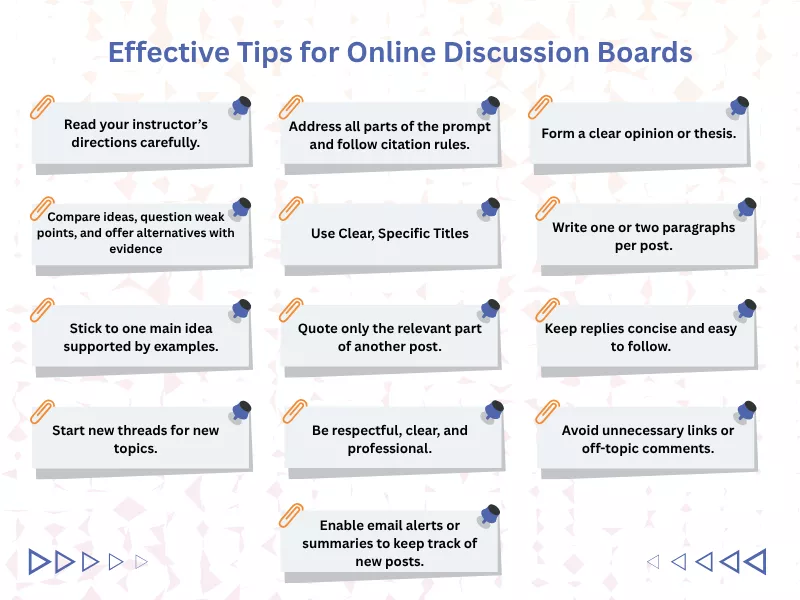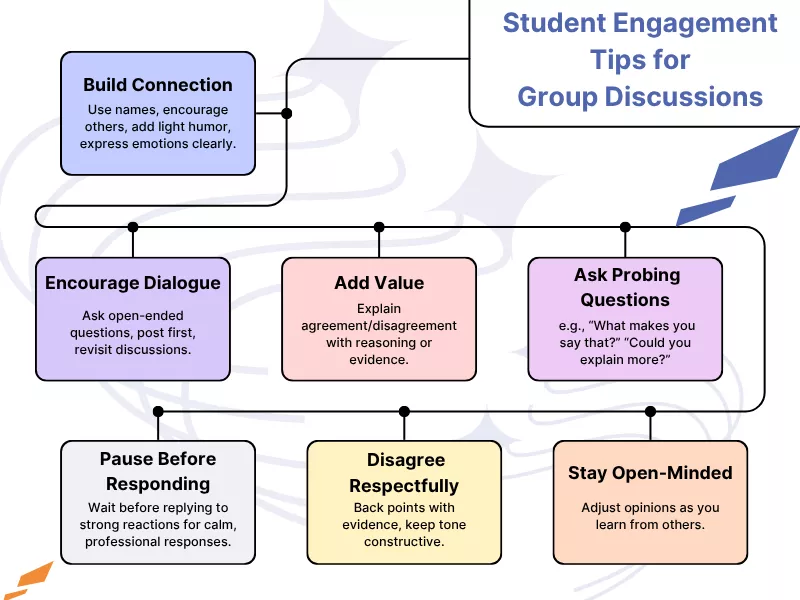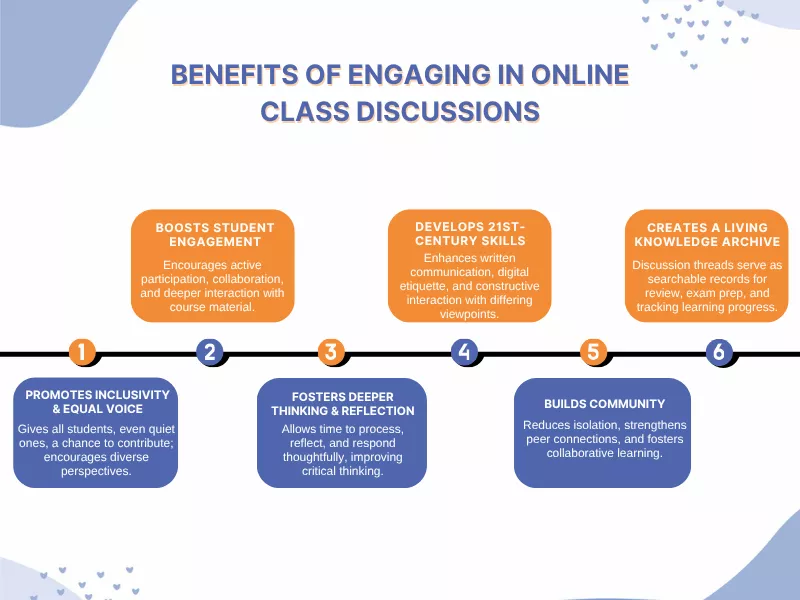Engaging in Online Class Discussions is where your online learning truly comes to life. This activity goes beyond classroom lectures and textbooks. This is the virtual space —often a discussion board or forum —where ideas are challenged, questions are explored, and a real sense of community is built.
Basically, it is a unique conversation that doesn’t happen in real-time, giving you the space for critical thinking before you share. This is your opportunity to not only master the course content but also to sharpen your own perspective. Furthermore, you can connect what you’re learning to the world around you and transform a class into a collaborative learning experience.
In this blog, we have shared useful tips to improve your online group discussion skills to stay engaged in e-learning.
Table of Contents
ToggleWhat Are the Effective Tips for Online Discussion Boards?

Engaging in Online Class Discussions is one of the effective learning styles. It transforms online learning participation from a passive experience into an active and collaborative journey. Here are some Online discussion tips for you!
1. Take Time to Understand the Discussion Post Requirements
First of all, check your instructor’s directions carefully. Remember, some discussions are open-ended, while others have specific prompts. If discussion prompts are given, address every part of the question. Also, note any requirements for references or citations.
2. Prepare Before You Post
For open-ended discussions, complete all assigned readings first. Develop a clear thesis or perspective, then engage with others by
- Comparing ideas
- questioning weak arguments
- Or offering alternative viewpoints
Always back up your comments with evidence from course materials or credible sources.
3. Use Clear, Descriptive Titles
A clear title helps readers instantly grasp your post’s focus. Avoid vague titles like “Thoughts on this week’s lesson.”
Instead, be specific, for example, “Why Marx’s Concept of Alienation Still Applies to Today’s Workplace.” A precise discussion topic draws readers in and signals the depth of your contribution.
4. Keep Posts Concise and Focused
Suppose, the length isn’t specified. Then aim for one to two focused paragraphs. Stick to one main point per post, supported by examples or references. Clarity and brevity make your message easier to read and more engaging.
5. Make the Context Clear
Next, you must help readers follow the conversation. Use a short quote from the post you’re responding to, especially if the original message is long. Trim what’s unnecessary, and if replying point by point, you can insert your comments in bold between the relevant paragraphs.
6. Manage the Conversation Effectively
What to do if a new topic emerges? The solution is starting a new thread to keep the discussion organized. Online chats are a great way to ask questions and share insights during virtual lectures. Enable email alerts or daily summaries to stay updated without constantly checking the forum.
Keep your messages brief, clear, and relevant. Avoid posting unnecessary links or off-topic comments, and focus on adding value to the discussion.
If you need expert help with an online discussion forum, consider choosing Take My Online Class for me services.
How to Stay Engaged During Online Learning Discussions? Student Engagement Tips

Here are some tips to stay engaged during online learning discussions
1. Build Group Connection
Online discussions thrive on collaboration. To take this collaboration ahead, use first names, offer encouragement, and respond promptly.
Add light humour when appropriate and make your emotions clear with phrases like “I’m unsure about this” or “I feel strongly that…” since tone can’t always be read online.
2. Encourage Dialogue
If you’re posting first, set the tone by asking open-ended discussion questions or making bold, thought-provoking statements. Revisit the discussion later to reply and continue the conversation.
3. Add Value to the Conversation
A simple “I agree” doesn’t move the discussion forward. Explain why you agree or disagree and provide reasoning or evidence to invite further dialogue.
4. Ask Probing Questions
Encourage deeper discussion by asking thoughtful follow-ups, such as:
- What makes you say that?
- Could you explain that idea further?
- How are you defining that term?
- What are some alternatives?
5. Stay Open to Changing Your View
When you participate in the discussion, it’s okay to adjust your opinion as you learn from others. Acknowledge when new insights change your perspective; it shows growth and engagement.
6. Disagree Respectfully
It’s fine to challenge ideas, just do it politely. Back your points with evidence and keep the tone constructive. Respectful disagreement often leads to the most meaningful learning.
7. Pause Before Responding Emotionally
If a post sparks a strong reaction, take a break before replying. Waiting even a few hours or overnight helps you respond calmly and professionally instead of reacting in the heat of the moment.
What are The Benefits of Engaging in Online Class Discussions?

The importance of participation in online class discussions cannot be overstated, as it is a key factor in a successful online learning experience. Here are 5 benefits of engaging in online class discussions:
Promotes Inclusivity and Equal Voice
The online format of LMS discussion provides a platform for all students to contribute, including those who may be hesitant to speak up in a traditional discussion setting. This creates a more inclusive learning environment. In this online environment, a wider range of perspectives can be shared.
This, in turn, enhances the overall student engagement in online classes. Also, the flexibility of asynchronous discussions allows for more thoughtful and well-composed responses. As a result, this increased participation in online discussions leads to a more equitable and robust conversation.
Boost Student Engagement in Online Learning
Another benefit is the significant improvement in student engagement in online learning. A well-crafted discussion assignment requires learners to move beyond passively receiving information and instead actively participate in constructing their knowledge.
This structured interaction with course material, instructors, and peers is crucial. It also opens pathways for Student collaboration in e-learning, as individuals build upon each other’s insights to reach a more comprehensive understanding.
Fosters Deeper Thinking and Learning Reflection
The asynchronous nature of many online forums allows students to reflect and gives them the time to
- Process information
- Reflect on their peers’ contributions
- Formulate more in-depth responses
This extended time for consideration within the online learning environment encourages a higher level of critical thinking than the fast-paced, spontaneous nature of in-person, face-to-face discussion. This also leads to better learning outcomes.
Engaging in Online Class Discussions Develops 21st-Century Skills
Again, regular participation in online forums can help students hone essential modern skills. Through effective online discussions, students can
- Articulate their thoughts clearly in writing
- Practice digital etiquette
- Respond constructively to differing viewpoints
This form of communication is vital for success in both academic and professional settings that are increasingly virtual.
Effective Online Discussion Builds a Sense of Community
Apart from facilitating active learning in online courses, online discussions also foster a strong sense of community among students. This platform for students to interact with one another on course material can reduce feelings of isolation that sometimes accompany distance learning. This sense of connection and collaboration strengthens the overall learning experience.
Effective Discussion Creates a Living Archive of Knowledge
Digital discussion threads create an accessible and searchable archive of the course conversation that can keep students connected to the material. This digital portfolio prompts students to
- Review past topics
- Track their own intellectual journey throughout the course
- Study for exams
This lasting resource boosts course engagement while improving online participation and reinforces learning long after the initial discussion has concluded.
Conclusion
Ultimately, online discussions are more than an assignment; they are a training ground for the modern world of open and distributed learning. While it’s an effective way to get students to engage, its true value is what these skills provide students for the future. For students online, strong student participation through virtual classroom interaction builds confidence and sharpens critical thinking. Effective online communication transforms the digital classroom into a collaborative space, turning passive observation into active student learning and preparing you for a connected, professional world.
Frequently Asked Questions
Why are discussion boards so important?
Fundamentally, it’s a central part of the online teaching and learning model. Discussion forums create a unique space where instructors and students can engage with ideas outside of lectures. Instead of just passively reading, using the discussion board actively involves students in learning by requiring them to analyze concepts and build arguments. In short, it’s a key way instructors can see how you are processing the course material.
How do I write a strong initial post?
To start, it helps to think about your instructor’s goal. Your online instructor puts careful thought into crafting discussion questions because they don’t want a simple summary of the readings. Specifically, they use discussion to see if you think critically and apply what you’ve learned. Therefore, a quality student’s post will move beyond basic facts to offer analysis, a unique connection to a real-world event, or a respectful counter-argument.
How can I make my posts more interactive?
To make your posts more dynamic, you should think beyond the traditional discussion board. For instance, some courses now incorporate video discussion tools, which allow for more personal and nuanced replies. Moreover, an instructor might also encourage students to create content like a concept map or a brief summary of an outside resource. Ultimately, this is a fantastic way for students to bring new energy and value to the conversation.
How can I manage overwhelming discussions?
That’s certainly a common challenge. To make things more manageable, many instructors split classes into smaller discussion groups. If yours doesn’t, you can create a similar feeling by focusing your replies on just a few classmates to build a consistent dialogue. Finally, as a pro tip and a strategy often highlighted in resources like the Journal of Educators Online, it helps to have a personal rule that requires students to post their initial thoughts before reading what everyone else has said. This ensures your original ideas always shine through.

